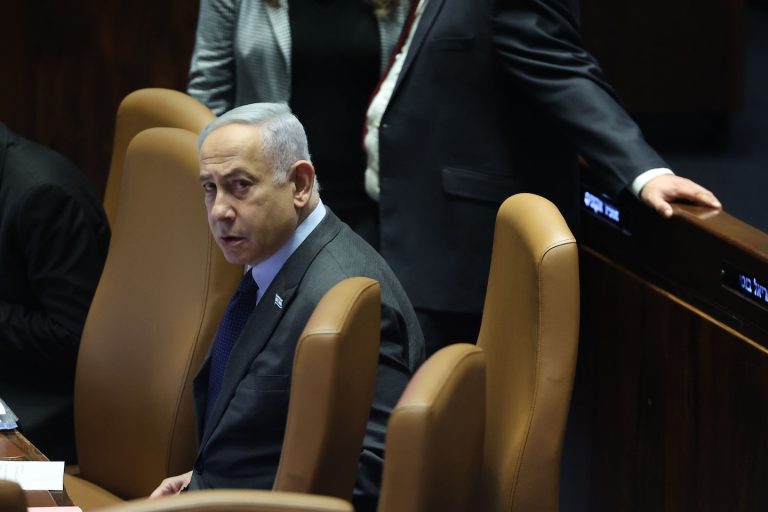Regarding the first question, Netanyahu continues to deviate. But he finally spoke out about the second proposal through a one-page proposal that was submitted to the security cabinet on Thursday night and made public after midnight. His office said the outlines were intended to be a starting point for further discussions.
The debut of the plan, which was deemed off limits for public discussion, came as a surprise to many in the government, according to an Israeli official close to the discussions. The new policy came after a meeting on Thursday with White House envoy Brett McGurk, and came as momentum appeared to be building in Paris-based talks toward a potential ceasefire and hostage release agreement with Hamas.
“It coincided with the Americans,” said the official, who spoke on condition of anonymity to talk about internal discussions.
The US Embassy in Jerusalem did not respond to a request for comment.
“Netanyahu’s first goal is to buy time,” said Gideon Rahat, a senior fellow at the Israel Democracy Institute and head of the political science department at Hebrew University. “He got as much time as he could on this in the face of pressure from Joe Biden.”
The proposal put forward by Netanyahu largely reflects what he has said publicly. Its most important points are:
The Israeli army will remain in Gaza as long as it takes to disarm the Strip, eliminate Hamas, and prevent it from regrouping.
Israel will assume greater control of Gaza's southern border, in cooperation with Egypt “to the extent possible,” and will establish buffer zones on the border to prevent smuggling and further attacks. Egypt rejected any Israeli role on its border with Gaza.
The main UN aid agency in Gaza and the West Bank, UNRWA, which Israel accuses of colluding with Hamas and promoting hatred for Jews, will be dissolved and replaced.
The proposal rejects any permanent agreement with the “Palestinians” that is not achieved through direct negotiations with Israel, as well as any “unilateral” Palestinian state.
The Palestinian Authority in the West Bank city of Ramallah said the broad lines were unacceptable.
Nabil Abu Rudeina, spokesman for Palestinian Authority President Mahmoud Abbas, said that the plans proposed by Netanyahu aim to continue the Israeli occupation of the Palestinian territories and prevent the establishment of a Palestinian state. He added, “Israel will not succeed in its attempts to change the geographical and demographic reality in the Gaza Strip.”
Critics in Israel also dismissed the outline as a compendium of ideas already rejected by the international community and Israel's most important supporters.
These points will be welcomed by Netanyahu's conservative base, but they do little to advance strategic considerations about post-war Gaza, said Chuck Freilich, former deputy chairman of Israel's National Security Council and a senior fellow at the Institute for National Security Studies in Tel Aviv.
“This is just a display of Israel’s extremist positions,” Freilich said. “The pressure was mounting on him to come up with something, so he came out with this document and the next day slapped it on top.”
But if the goals were in line with Netanyahu's rhetoric, political observers said the proposal was notable for breaking the official silence on the subject. He did not call for the re-establishment of Israeli settlements inside Gaza, as some of Netanyahu's coalition partners have demanded.
As many Israeli political observers have pointed out, it has not closed the door on Palestinian Authority officials playing a role in Gaza, as Netanyahu has repeatedly done in the past.
Instead, the blueprint describes a civil service staffed by “local entities with administrative expertise,” without identifying these entities. Anyone with ties to terrorist groups or countries that “support terrorism” – a possible reference to Qatar and Iran – will be denied entry.
Senior Israelis have previously pushed the idea of unaffiliated tribal leaders taking charge of many government functions, which critics dismiss as an unworkable alliance with inexperienced locals who might be seen as Israel's proxies.
Not explicitly rejecting (or even mentioning) the Palestinian Authority, which rules in the West Bank, at least avoids another public break with the Biden administration, which has pushed the idea of a “revitalized” authority as the best place to seek long-term administrative stability in Gaza.
“It is ambiguous enough to enable him to control his coalition on the one hand and give a hint to Biden and others that there may be some kind of role for the Palestinian Authority when it is not about security issues,” Rahat said.
But the Palestinians considered the document's silence an insult.
“The Palestinian Authority is simply ignored, making it as if it does not exist,” political analyst Mustafa Ibrahim told The Washington Post in a phone interview from Rafah, in the southern Gaza Strip, where he lives with his family. He added: “What Netanyahu's plan presents is a vision centered solely on Israel and its interests, without any regard for the humanity or rights of the Palestinians.”
Hazem Baalousha in Amman, Jordan, and Itay Stern in Tel Aviv contributed to this report.

